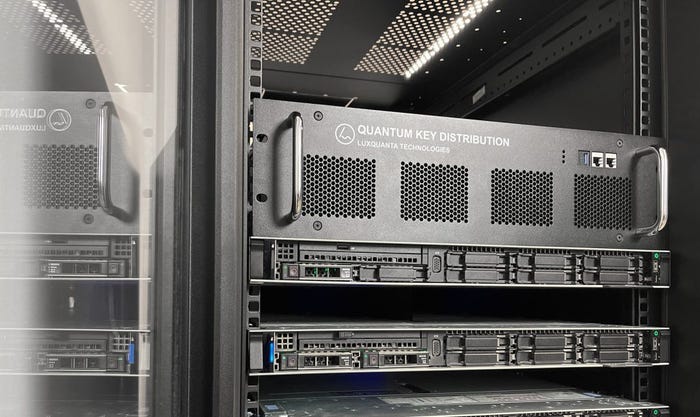Telecoms.com spoke to Vanesa Diaz, CEO at Quantum Key Distribution firm LuxQuanta about quantum computing becoming a reality and the technologies pitched as the best defence against nefarious future uses of it.
April 20, 2023

Telecoms.com spoke to Vanesa Diaz, CEO at Quantum Key Distribution firm LuxQuanta about quantum computing becoming a reality and the technologies pitched as the best defence against nefarious future uses of it.
Quantum computing, the next stage in supercomputing based on mind bending quantum mechanics principles, is getting more and more column inches as we appear to be getting closer to it reaching sufficient reliability and subsequent widespread availability.
The benefits are not precisely defined, but in a nutshell the vastly greater computing horse-power might be used to cure diseases, crack complicated economic problems, and basically could be used to solve any sort of complex problem the future might throw at us.
On the downside, it could also render current network cryptography and security basically irrelevant – a worrying prospect were it to get into the wrong hands.
What is Quantum Key Distribution?
LuxQuanta is a Barcelona based firm which deals in Quantum Key Distribution (QKD) systems, which are designed to be integrated into existing network infrastructure and bolt on a ‘quantum-safe’ layer of security on top of mathematical cryptographic techniques.
The pitch is that cryptographic techniques used today are not future-proof, because they will be easily hackable by quantum computers once they reach a specific capacity. What QKD, or Quantum Cryptography does is use quantum mechanical properties to create a shared key using an optical fibre or through free space, and using quantum signals (weak light pulses) it can detect hacking attempts. This, claims LuxQuanta makes the shared key resilient against an attack from a quantum computer. We spoke to Vanesa Diaz, Chief Executive Officer at LuxQuanta, to find out more.

“What we do is instead of relying on a mathematical problem to deliver this key that you will use to encrypt your information, is use the same link that we’re going to use to transmit the data to transmit information so weak in the form of photons, that these photons enter into the quantum realm,” says Diaz. “So it makes that channel, that optical fibre where I’m sending the information, super secure because if anybody tries to sneak in while I’m sending the information of the key, I will be able to tell.
“So at the end what you obtain from these two machines now connected at both sides of the link that you want to protect, they deliver a key to encrypt our server, and then you start encrypting the information as you would have done previously. So that’s the beauty of it, we deliver a technology that is unhackable and is future proof because we don’t care whether you attack us with a quantum computer, or two or three – at the end we’re relying on the laws of quantum physics and those are unbreakable.”
“The [consultants] that we work with, they estimate the quantum key distribution market should reach $5 billion in revenue by 2031. That’s a hockey stick in terms of market growth and I believe that we are definitely on the right pathway towards… it’s getting intense.”
When it comes to defending against quantum powered threats from hackers, as with most things there is more than one way to skin a cat – though LuxQuanta (unsurprisingly) pitches QKD as the gold standard.
“There is a discussion out there in the industry as to whether you should rely on software, meaning more complex mathematical problems – this is post quantum cryptography – and that definitely has an application for us. They are allies because it’s easier always to offload software or get software from someone and install it in your network rather than investing in hardware. But it’s true that if you really, really want to have the guarantee that nobody can hack it, absolutely nobody, then you do have to go to Quantum Key Distribution. And that’s how things are.”
The dangers of quantum computing powered hacks
So that’s the QKD sub-sector in a nutshell, but where are these quantum powered attacks of the future going to come from? Diaz argues it will be the same players that already engage in malware and ransomware attacks, but this time armed with bigger guns.
“This is crime, organised crime. Here in Spain we’ve had a cyber attack to a hospital, it happened twice, and they are asking them for money to give back the information that they have stolen. It’s just pure crime out there. The geopolitical context, protecting your own governmental information, is something that has been done for the beginning of time and that continues. So it’s not that the enemy has changed really, the enemy for each potential use of this technology is pretty much the same. In the end, everybody is concerned about protecting the confidential data from any potential attacker.”
Quantum chips in their present form live in facilities owned firms like IBM and are contained within in large expensive housings designed to keep them at temperatures colder than outer space, in order for the mind-bending physics to operate. A bad actor making use of quantum computing to provide a greater threat than can currently be mustered would in some way shape or form need access to this currently rare commodity, or future iterations of it. But Diaz thinks eventually, the technology will be made available to everyone, and that could just as easily include cyber-criminals.
“I believe that there will be models that will make quantum computing accessible to everybody. Same as today. It is being made available… you can log in, you can [run] algorithms there. So I think that the bad guys always find a way, that’s for sure… the ones that have big resources, they could always source the hardware themselves. These manufacturers of quantum computers, eventually the target is to sell them. So I really believe someone can acquire them and then do whatever they want to with them.”

Balancing the opportunities of quantum computing with the risks
When it comes to the tech firms developing quantum computing you do get the sense that they are cognisant of the potential dangers of it getting into the wrong hands, and are there appears to be a good amount of effort put into developing tools to mitigate the harms, in a way that you don’t get the sense of with AI development.
“One of the messages that I’ve tried to convey or the in the industry is precisely that – you don’t take these things lightly,” continues Diaz. “[Some] say quantum computers are still a long way down on the road – not really, if you look at the latest estimations you hear as close as 2030. Some people say that it is not irrational thinking that the worst case scenario is 2027. That’s around the corner from now. So that’s why I think people are waking up to that and that’s the reason there is a lot of interest from all sorts of verticals.
“It is not only about telecommunication operators anymore, not at all. People from the food industry have come to us… because they always have a department in all these verticals that are looking at new technologies, and they look at potential hazards and how to protect themselves. There is always at least a team of people in each of these verticals looking into quantum technologies, all of them, and so there is a lot of traction from them now. Where do I need to protect my information? How can I use Quantum Key Distribution? I think they are grasping now the real risk. You don’t have so many years to prepare yourself, so the sooner you start, the better.”
Get the latest news straight to your inbox. Register for the Telecoms.com newsletter here.
About the Author(s)
You May Also Like








.png?width=300&auto=webp&quality=80&disable=upscale)


_1.jpg?width=300&auto=webp&quality=80&disable=upscale)


.png?width=800&auto=webp&quality=80&disable=upscale)